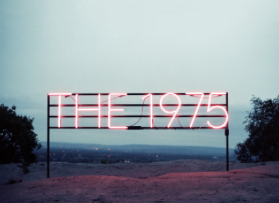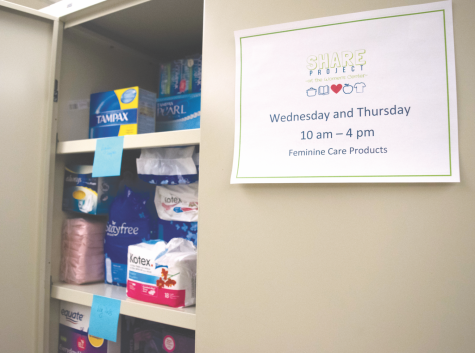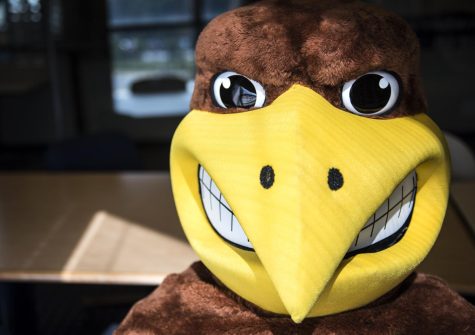Alternative Press Music Awards will be held in Cleveland July 22
June 24, 2015
Editor’s Note: This is the first in a series of stories about the Alternative Press Music Awards, which will be held July 22 in Cleveland.
Mike Shea, founder and CEO of Alternative Press Magazine, started the music magazine when he was 19 years old in his mom’s house in Aurora. A Cleveland-area native, Shea attended Kent State and majored in videography. He originally created the magazine as a music fanzine, but it soon became a recognized music publication worldwide, thus leading to the creation of the Alternative Press Music Awards in 2014. This year’s awards will be held July 22 at Quicken Loans Arena in Cleveland and will be hosted by the rock band All Time Low.
JK: You grew up in the Cleveland area, right?
MS: Yup, I graduated in ‘84 from Aurora High school, and half the kids went to Kent State University. I went to Kent from ‘84 to the start of ‘86, and I worked at Record Revolution (a local record store). My freshman year, I also took journalism classes and joined The Kent Stater actually. I was one of the entertainment reporters for awhile and did some interviews for them with local bands and with a couple bands that were coming through the area as well.
JK: When did the idea for Alternative Press Magazine come up?
MS: It was at the end of my freshman year that the idea for AP came up, and the fanzine started in the summer of ‘85. It came out in June, and we put out a couple monthly issues in a row. I was going to return to the film school at Kent State, but it had shut down because the one film professor had retired. I was kind of left with the radio classes, and I really didn’t want to do radio. So me and my mom had the conversation, “Well, you’re not doing anything with film like you wanted, and you’re just running up student debt,” and at this time, AP was starting to pick up steam, so she said, “Well, you’re having fun with this zine thing, so instead of running up debt, why not just do that, and maybe it will pay your bills.”
I dropped out midway through my sophomore year at Kent, and I went right into AP. Kent State is great for journalism, though; I got my basic journalism training there and from The Stater. I got further embedded with record companies and local concert promoters; then when I was starting AP, it just all melded together with my work with The Stater, and I went from there. That’s why the first issue of AP kind of looked like a high school newspaper because I was my high school’s newspaper editor, I was on yearbook, so I knew how to make things look presentable and professional, compared to your standard zine which is usually all handwritten and cartoons.
JK: What kind of work went into making AP so successful over these 30 years it’s been around?
MS: I think what kept AP successful was that we adapted. We never really grew older with our readership, we kept changing to whatever our readers’ music tastes were, within this alternative, rock kind of world. So our readers were kind of always the misfits; they were never the ones in the mainstream, they were always the ones just underneath that were into things more groundbreaking.
When we first started AP, it was punk rock and then there was grunge, metal, alt. rock, British waves, goth, emo and then we returned back to our roots with a modern kind of punk with a lot of pop-punk influence in it before we saw the emo revival and screamo phases. It’s very much a community based on fandom and idolized musicians. We overwhelmingly have a new generation of fans each year and every year, we graduate a senior class of kids that kind of grow up, and they’re now in their second year of college, and they grow up getting out of the phase of ripping pictures out of magazines of bands for their walls and daydreaming. The roughly 14-15 year olds come in almost as our freshman class every year and they’re like “I like Taylor Swift but I kind of feel like dying my hair crazy.” So we’re their homebase and we’re a community, a community of misfits, and that’s essentially why we’re still around.
We just felt like we needed to keep updating our software to not be like a typewriter and become extinct. We’re actually pretty amazed too that we’re still around. We started out like well, we’ll get a couple issues out, and then what the hell are we going to do with our lives; we had no idea. Because we’re independent, we’ve sometimes nearly been put out of business because of an economic crash. We never really made five-year plans; we were more like, ‘Are we going to be around in a year?’ We have people here that are called AP Lifers because they kind of give up their life for a while when they’re here. That’s why a lot of our staff are younger; they work long hours, they go to shows, they live and breathe this AP community and everything we’re doing, which is one of the reasons we’re around is because we’ve got 30 years of those kinds of people working here.
JK: What inspired the creation the APMAs?
MS: I think what inspired it was the fact that we needed a day to take a break and celebrate. You have the Grammys and other awards shows but there wasn’t anything in the United States for this kind of community. I thought, wouldn’t it be great if we got everybody in the same spot, where everybody who’s anybody is always there. It’s not just about the awards or the performances; it’s about all these musicians and crew and VIPs coming to hang out with each other. What made the show so successful was the viralness of the hanging out part; the night before the show, all the artists are getting together taking selfies and whatnot. It was a way for all us misfits in the industry to come together. So we’re really happy how it turned out, and the goal is always to make things bigger and better without getting ahead of yourself for the second year and that’s what we’re doing now.
JK: Were the awards well-received by both the fans and the musicians last year?
MS: It was very well received by everyone; we trended on Twitter for over 24 hours, were number 1 worldwide and we trended on Facebook for a day. Even now, the hashtags are still going through like crazy, even before we announced this year’s show and voting. Last year, we got about 310,000 votes, and we’re nearly there (now), and voting doesn’t stop until the second week of July. Thirty percent of our votes are coming from overseas, so it’s going to be streamed worldwide now. Last year, we didn’t have that, so this year, we’re expecting the viewership to go through the roof. We have some amazing moments we’re putting together, and we’ve just been humbled by how well it’s been received by fans and musicians.The point is to create something for a market that is lacking something, and this was missing it; this community is underserved, and this is sort of a format for us to make sure this community is taken care of, which is the reason that this all has worked.
JK: What do you think the APMAs provided AP with?
MS: I think it provides us with legitimacy. At least that’s what I was told by a lot of people last year in the industry. Our scene is sometimes discarded by the mainstream news journalists. The only reason we’re starting to get some notice on places like BuzzFeed is because some of the writers that used to write for us, or writers that grew up reading AP, now are being hired by these mainstream agencies and are still writing about the scene. Prior to that, they weren’t writing about it because a lot of people thought the scene was all teenager music. The funny thing is we’ve been looked down on by people that have worked at these major establishments who don’t have their jobs anymore, yet we’re still here because of our demographic; there’s nothing more enthusiastic than a teenage music fan. So for our community, it was about legitimacy. We had an awards show, we got all dressed up and didn’t come in our t-shirts, and it blew up the media and online, so we really proved ourselves.
JK: Why did you choose to add two new awards categories?
MS: We actually almost added twelve new categories, and we’ll see if we add some more next year. Because of the sub-genres in this music community, it’s very difficult to pick just six vocalists, or six guitarist out of post-hardcore, pop-punk, metal, emo revival, and it wasn’t fair, you’ll never make everybody happy with nominations and you’ll always get hell. It’s really difficult sometimes to put people in different categories against each other. So that’s why we started the underground band award. We had actually developed sub-genre nominations like I’d mentioned, but we scrapped them in the end because we just had too much disagreement internally about whether or not it was going to take the show too long. We just stuck with adding the Best Music Video and Best Underground Band categories. We did the nominations so that they would be competitive but also to give nods to some people who really did deserve them.
JK: Is there an artist you’re especially excited to see?
MS: I’m pretty excited for all of them because there’s a bunch of different artists from different genres putting together collaborations and stuff, it’s really hard to answer that right now. Haley Williams from Paramore is performing with her fiance Chad Gilbert of the band New Found Glory. That’s going to be a great moment I’m really looking forward to. Panic! at the Disco is also coming back as a band now. Halestorm is going to perform, as well as All Time Low, who are always a riot and crazy fun. Sum 41 is playing the APMAs as their first live show in over two years and (that) is going to be incredible, and I hope it turns out well for them. There’s so many, and I’m really happy with the lineup so far.
Contact Jenna Kuczkowski at [email protected].























